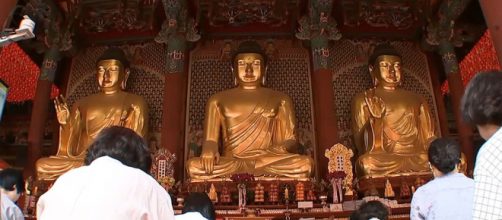A government-funded campaign to promote Christmas music has drawn opposition from South Korea's Buddhists. The Korea Times reported that the Association of Korean Buddhist Orders had gone to court to stop the Ministry of Culture, Sports and Tourism from using public funds to promote Christmas music.
Government support for 'a Christian missionary project'
The ministry launched the campaign together with the National Council of Churches in Korea, the United Christian Churches of Korea, and the Catholic Archdiocese of Seoul, The Korea Herald said. According to The Korea Times, a statement from the Jogye Order of Korean Buddhism noted that the government "is leading a Christian missionary project."
The Telegraph quoted the statement claiming that the constant playing of Christmas carols was "a deadly weapon and...
nothing more than pollution." The paper said that the Ministry of Culture, Sports and Tourism had stated that it would spend one billion Korean won on promoting the playing of Christmas music on radio stations and in public spaces, such as shopping malls.
The Korean Times said that many people in South Korea had complained that the Christmas season was becoming less festive. This sentiment was likely the result of a new copyright law requiring fees to be paid for music played in large commercial areas, which had made it harder to hear Christmas music in public, the newspaper said. The paper noted that the Korea Music Copyright Association was now pushing 22 Christmas carols available for free.
The Korea Herald said that the country's major radio broadcasters were expected to play Christmas music in the days leading up to the holiday. The paper said that the campaign for Christmas music had been first suggested by Cardinal Andrew Yeom Soo-Jung, the recently retired Catholic archbishop of Seoul.
Allegations of more discrimination
The Jogye Order complained that the campaign promoting Christmas carols was just one of the discriminatory policies being carried out by various governmental bodies in favor of Christians, the paper said. The organization said another example of pro-Christian favoritism was a government-supported plan for a national Catholic pilgrimage route going past two Buddhist temples, the paper added.
The newspaper quoted the Buddhist organization as claiming that almost 20 public choirs had come to be dominated by performers from churches. The Jogye Order had also voiced displeasure with President Moon Jae-in's October meeting with Pope Francis, The Korea Herald said.
Census says most Koreans are not religious
The Korea Times recalled the 2015 census indicating that 56.1 percent of Koreans did not consider themselves religious. According to the newspaper, the census said that the country had 9.68 million Protestants, 7.62 million Buddhists, and 3.89 million Catholics. South Korea had a total population of about 52 million.


